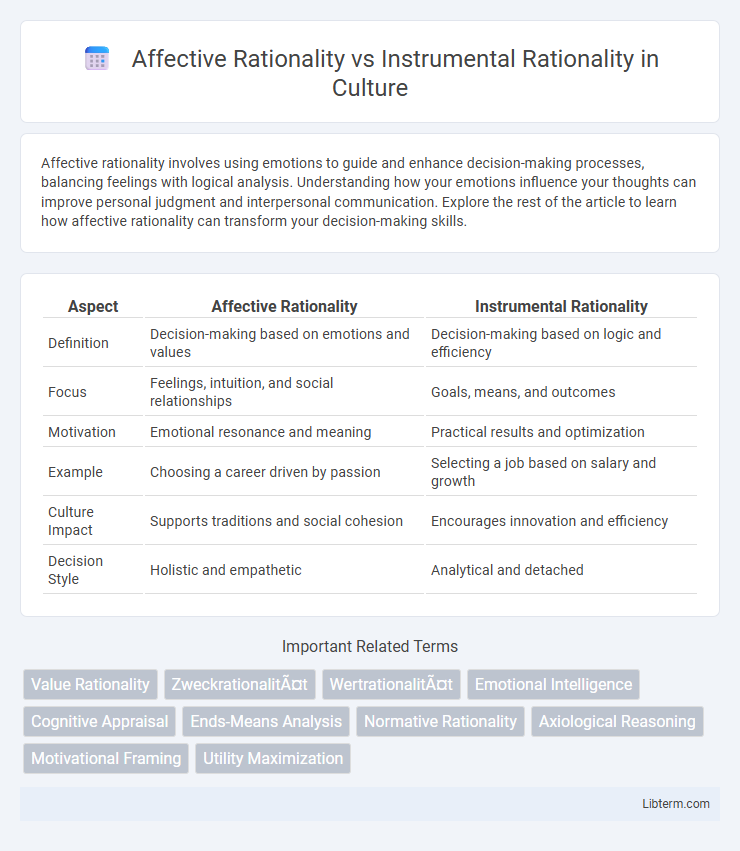Affective rationality involves using emotions to guide and enhance decision-making processes, balancing feelings with logical analysis. Understanding how your emotions influence your thoughts can improve personal judgment and interpersonal communication. Explore the rest of the article to learn how affective rationality can transform your decision-making skills.
Table of Comparison
| Aspect | Affective Rationality | Instrumental Rationality |
|---|---|---|
| Definition | Decision-making based on emotions and values | Decision-making based on logic and efficiency |
| Focus | Feelings, intuition, and social relationships | Goals, means, and outcomes |
| Motivation | Emotional resonance and meaning | Practical results and optimization |
| Example | Choosing a career driven by passion | Selecting a job based on salary and growth |
| Culture Impact | Supports traditions and social cohesion | Encourages innovation and efficiency |
| Decision Style | Holistic and empathetic | Analytical and detached |
Understanding Affective Rationality
Affective rationality involves decision-making driven by emotions and feelings, integrating subjective experiences with cognitive processes to guide behavior. It contrasts with instrumental rationality, which emphasizes goal-oriented, logical analysis and optimization of outcomes based on objective criteria. Understanding affective rationality enhances insights into human motivation, highlighting how emotional context shapes judgments and choices beyond purely utilitarian reasoning.
Defining Instrumental Rationality
Instrumental rationality refers to the process of making decisions based on the most efficient means to achieve a specific goal, emphasizing outcome-oriented reasoning and practical utility maximization. It involves logical evaluation of available options, cost-benefit analysis, and selecting actions that effectively produce desired results. This form of rationality is central to economic models, game theory, and decision sciences, prioritizing calculated strategies over emotional or subjective influences.
Historical Origins of Rationality Concepts
The historical origins of rationality concepts trace back to ancient Greek philosophy, where Plato emphasized affective rationality through the harmony of soul's parts, while Aristotle introduced instrumental rationality as practical reasoning for achieving goals. During the Enlightenment, thinkers like Kant further refined these ideas, distinguishing reason's role in moral judgment (affective rationality) from its function in efficient problem-solving (instrumental rationality). This duality has shaped contemporary debates in cognitive science and philosophy regarding emotion's role in decision-making versus purely goal-oriented rational calculation.
Core Differences Between Affective and Instrumental Rationality
Affective rationality centers on emotions and values as primary guides for decision-making, emphasizing personal meaning and subjective experiences. Instrumental rationality relies on logical analysis and goal-oriented strategies to maximize efficiency and achieve specific objectives. The core difference lies in affective rationality prioritizing emotional resonance, whereas instrumental rationality prioritizes objective utility and means-ends reasoning.
The Role of Emotions in Decision Making
Affective rationality emphasizes the influence of emotions in shaping decisions, highlighting how feelings provide valuable information that guides choices beyond pure logic. Instrumental rationality focuses on optimizing decisions based on objective calculations and expected outcomes, often disregarding emotional input. Integrating emotional awareness with logical analysis enhances decision-making effectiveness by balancing intuitive insights with strategic planning.
Practical Applications: Affective vs Instrumental Rationality
Affective rationality drives decision-making based on emotions and values, enhancing creativity and empathy in interpersonal relationships and therapy settings. Instrumental rationality emphasizes goal-oriented, cost-benefit analysis, optimizing efficiency in business strategies, policy-making, and technical problem-solving. Practical applications reveal that combining affective and instrumental rationality improves leadership effectiveness by balancing emotional intelligence with rational planning.
Cognitive Biases and Rationality Types
Affective rationality prioritizes emotional responses and feelings, often leading to cognitive biases such as confirmation bias and affect heuristic, which influence decision-making by emphasizing personal values and subjective experiences. Instrumental rationality emphasizes goal-oriented, logical reasoning aimed at maximizing outcomes, yet remains susceptible to biases like anchoring and overconfidence that distort objective analysis. Understanding these types of rationality and their associated cognitive biases is crucial for improving decision-making accuracy in both personal and professional contexts.
Impacts on Ethical and Moral Judgement
Affective rationality emphasizes emotions and values in ethical decision-making, leading to judgments deeply rooted in empathy and moral intuition. Instrumental rationality prioritizes logical analysis and goal-oriented reasoning, often resulting in ethical choices based on cost-benefit calculations and efficiency. The interplay between these rationalities shapes moral judgment by balancing emotional resonance with pragmatic considerations, influencing the consistency and depth of ethical evaluations.
Affective and Instrumental Rationality in Modern Society
Affective rationality in modern society emphasizes decision-making driven by emotions and values, shaping interpersonal relationships and ethical considerations. Instrumental rationality prioritizes efficiency and goal-oriented actions, commonly seen in technology, business, and policy-making processes aimed at maximizing outcomes. Balancing these forms of rationality is crucial for addressing complex social issues where both human experience and practical results are essential.
Integrating Both Rationalities for Balanced Decision Making
Integrating affective rationality, which involves emotions and values, with instrumental rationality, focused on logic and efficiency, leads to more balanced decision making by addressing both human motivations and practical outcomes. Effective integration enhances problem-solving by ensuring emotional intelligence guides goal-oriented strategies without compromising analytical rigor. Organizations that blend these rationalities demonstrate improved adaptability and stakeholder satisfaction through holistic, context-sensitive decisions.
Affective Rationality Infographic

 libterm.com
libterm.com